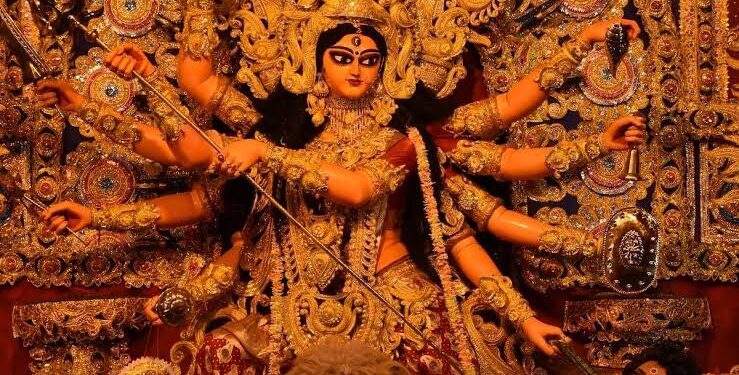Devotees across Odisha are passionately engaged in the auspicious celebrations of Durga Puja, observing Maha Saptami Puja at pandals and simultaneously commencing Maha Ashtami rituals at major temples and shrines.
Maha Saptami, which marks the traditional descent of Goddess Durga to Earth, signifies the start of the most sacred phase of the festival. Across the state, local Puja Pandals are filled with celebratory fervor.
The day’s Saptami rituals include:
- Maa’s Ghata Sthapana
- Navapatrika Prabesha
- Chakhyu Daan (offering of the eyes)
- Praan Pratishtha (infusion of life into the idol)
These rituals, which follow the earlier Maha Shashthi ritual of Bilwa Barani (worshipping near the bel tree), invoke the Goddess in all her glory, with mandaps resonating with sacred chants as larger crowds gather for the festivities.
Maha Ashtami Celebrations at Shakti Peeths
While pandals mark Saptami, the state’s revered Shakti Peeths are already observing Maha Ashtami Puja.
- At Jajpur, large numbers of devotees are flocking to the shrine of Maa Biraja for darshan.
- Ghatagaon in Keonjhar is witnessing the vibrant recitation of prayers for Maa Tarini, who is adorned in her spectacular Suna Besha (Golden attire).
- In Jhankada, Jagatsinghpur, Maa Sarala is set to adorn the Mahishamardini Besha, an attire representing her as the slayer of the demon Mahishasura. On Sunday midnight, special pujas were performed, including an offering of 108 Pana Handi (pots of water).
A priest from a local temple explained the day’s rigorous schedule: “The special rituals began around 4:20 am today. Maa was offered Nua Chuda and Manda Pitha as the special bhoga. Rituals such as Surya Puja and Chandi Patha are also performed on this sacred tithi.” He added that the Goddess’s Mahishamardini Besha will be performed later in the evening, with a sacrificial ritual scheduled for late Maha Ashtami night, around 3 am.
Devotees expressed their deep-seated faith, with one stating a feeling of being “truly blessed and happy to have the darshan of Maa Sarala on this auspicious day.” An elderly devotee highlighted the tradition of offering Nua Chuda (made from freshly harvested paddy) as bhoga to Maa for nearly 60 years.
The celebrations, marked by sacred offerings, divine adornments, and time-honored rituals, showcase the unwavering devotion and cultural heritage associated with the worship of Maa Durga across Odisha.





























